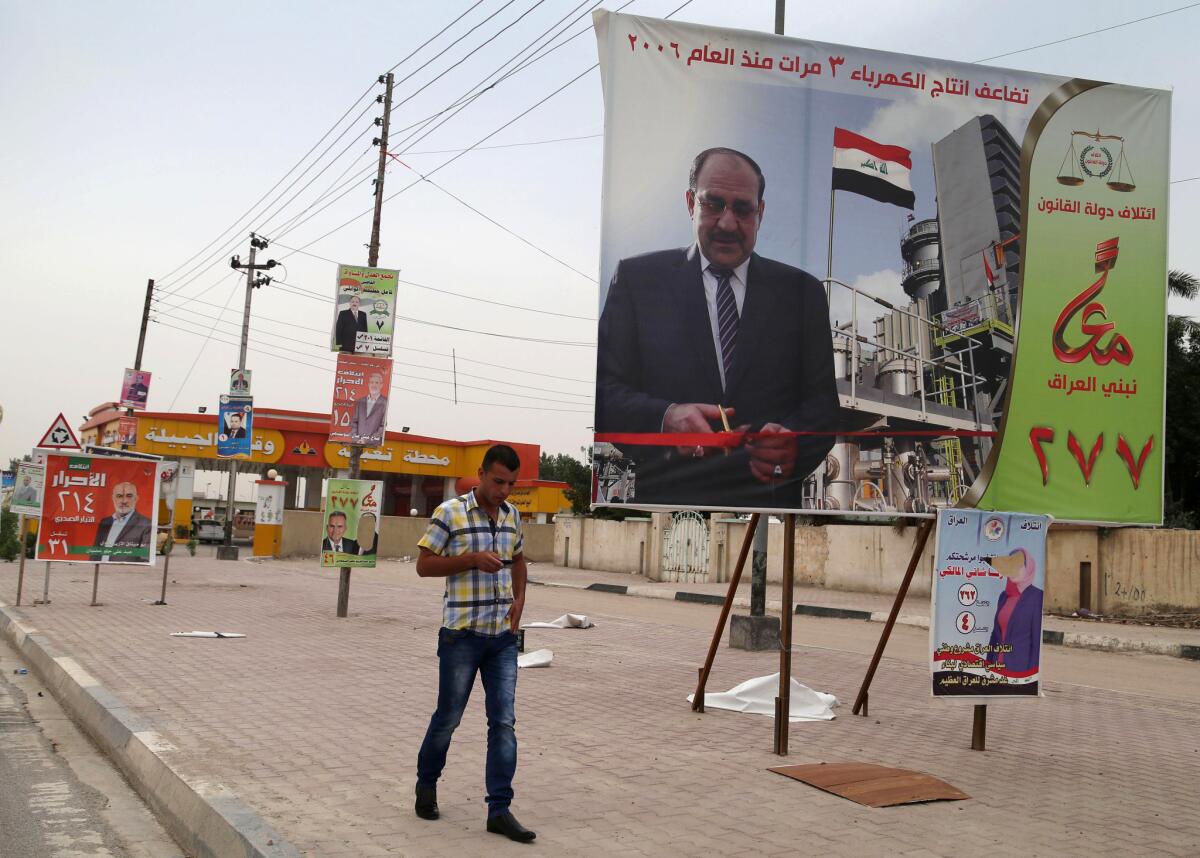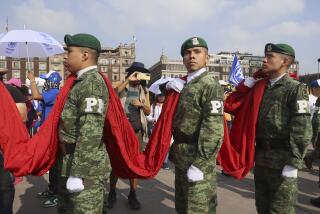Sectarian strife rises as Iraq election approaches

Iraq’s worst surge in sectarian violence since 2008, fueled by protracted political disputes, makes the first parliamentary election since the U.S.-led occupation anything but promising.
Over the last year, Islamic militants have targeted officials from the Shiite Muslim-led government of Prime Minister Nouri Maliki, who is poised to win a third term in Wednesday’s balloting. In turn, government security forces have struck back.
The United Nations says at least 8,868 people, 88% of them civilians, were killed in 2013, the highest toll in five years. The pace has continued in the first two months of this year, when about 1,400 were killed in attacks that have occurred nearly on a daily basis.
One attack killed 28 when the Islamic State of the Iraq and Syria, a Sunni Muslim militant group that is loyal to Al Qaeda, detonated two bombs on April 25 at a political rally staged by the Sadiqun bloc, the political wing of the Shiite Asaib Ahel al-Haq, or League of the Righteous.
Fears abound that violence will overshadow the election and plunge Iraq into the kind of violence typical of 2006-08, when U.S. troops were still confronting militants.
That civil strife came after the Sunni Arab minority had boycotted the 2005 election, the first after the fall of Sunni autocrat Saddam Hussein two years earlier. When a Shiite-dominated government assumed power, many Sunni dissidents formed the main part of the insurgency.
The violence led then-President Bush to send more than 20,000 additional U.S. troops to Iraq, beginning in 2007. The so-called surge strategy was generally seen as successful in reducing sectarian violence.
Although violence continued to mar the next election, in 2010, voter turnout reached 62%. The poll was hailed by President Obama, who at the time said that “the future of Iraq belongs to the people of Iraq.”
Analysts expect far less from this election, in which more than 9,000 candidates will compete for 328 seats in parliament.
“Unfortunately things are worse than in 2010,” said Michael O’Hanlon, a senior fellow with the Center for 21st Century Security and Intelligence and director of research for the foreign policy program at the Brookings Institution.
“Back then, there was a sense of national cohesion after the success of the surge — even if it was difficult to get through the [political] process itself,” he said. “Today, I am reminded more of how things felt in 2005, which is, of course, very unsettling.”
The presence of Al Qaeda-allied militants, some based in neighboring Syria, increased after U.S. forces pulled out of Iraq in 2012, in part because of a power vacuum in Syria, now in its fourth year of civil war, said John Drake, an Iraq analyst at AKE, a consultancy that advises companies doing business with Iraq.
The war in Syria probably emboldened Islamist militants on both sides of the Iraq-Syria border, Drake said. “It was as if these groups thought that they had a chance to establish some sort of Islamist emirate encompassing territory of both Syria and Iraq,” he said.
“The breakdown in authority on the Syrian side has also allowed these groups the opportunity to smuggle more equipment, money and personnel, allowing them to raise funding and consolidate their power,” he said.
Early this year, the Islamic State of the Iraq and Syria seized partial control of Fallouja and Ramadi in the western province of Anbar, sparking the closure this month of the prison in Abu Ghraib, outside Baghdad. Both cities are among a number of Sunni-dominated areas in central Iraq where it’s too dangerous for election officials to set up polling stations. Consequently, hundreds of thousands of voters are expected to be unable to cast ballots.
O’Hanlon believes the areas under Sunni militant groups’ control make up “about 5% to 10% of the country, but it is an important 5% to 10%.”
Drake added that “around 95% of the violence in Iraq currently takes place in seven provinces: Anbar, Babil, Baghdad, Diyala, [Tamim], Nineveh and Salahuddin. The areas where violence will prevent elections is still comparatively small, but it is in very sensitive areas, such as eastern Anbar province.”
Drake also noted that Iraqi security forces didn’t seem to have the same access to intelligence as they did in 2010. “Back then,” he said, “the U.S. was able to provide intelligence support, while the public was more able, and willing, to cooperate with the security forces and provide information.”
Militants are more likely now to avenge such cooperation, and much of the public in that area feels marginalized by the current government, which has been slow to improve infrastructure and quick to detain people on terrorism charges, Drake added.
“Many have been detained for extended periods without trial or significant evidence, and a lot of people feel that the move has been politically motivated by the predominantly Shiite government,” Drake said.
O’Hanlon said Maliki’s “sectarian-style leadership” has added fuel to fire in Iraq over the last year.
The prime minister “has used the opportunity of the U.S. departure to consolidate his centralized rule and has alienated both the Kurdish and Sunni communities,” wrote Paul Salem, a vice president of the Middle East Institute leading an initiative on Arab transitions, in an analysis published this year on the institute’s website.
“His policies since the U.S. withdrawal have increased sectarian and ethnic tensions in the country, and he has posed as the champion of Shiite interests against Sunni radicalism and Arab interests against Kurdish claims,” Salem wrote.
In the 2010 election, Maliki came in second to Iyad Allawi’s Iraqiya bloc, which had strong Sunni and Shiite representation. But Maliki eventually retained the premiership as part of a power-sharing pact among Sunnis, Shiites and Kurds.
Analysts agree that the pact ushered in a period of relative stability that has only recently begun to show signs of weakness as Maliki loses his ability to be a conciliator among competing interests.
Political experts believe Maliki will be reelected, but will lose the support of Kurds. And it is unclear how a third term will be viewed by neighboring Iran and by the U.S., which robustly backed him in 2010.
“If Maliki secures a third term and maintains his current policies, the Kurdish region of the north might move toward secession and Al Qaeda groups might more firmly consolidate their hold on the western, Sunni parts of Iraq, effectively splintering the country,” Salem said.
“Unless Maliki is replaced or drastically changes his policies, these might be the last elections in a nominally united Iraq.”
Tarek, a reporter from Cairo, is a visiting journalist at The Times sponsored by the Daniel Pearl Foundation in partnership with the Alfred Friendly Press Fellowships.
More to Read
Sign up for Essential California
The most important California stories and recommendations in your inbox every morning.
You may occasionally receive promotional content from the Los Angeles Times.










